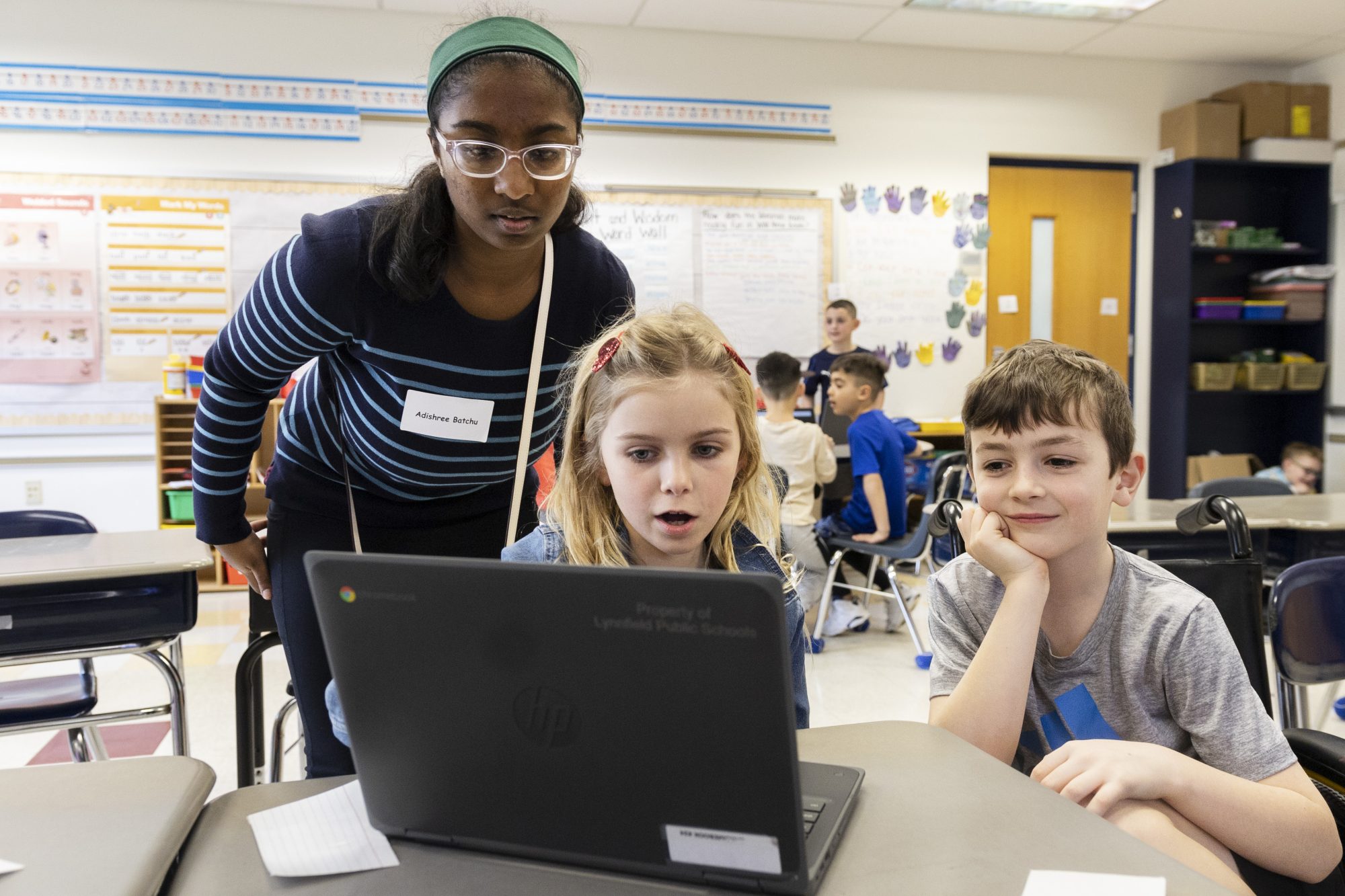LYNNFIELD – Who knew that coding could be this much fun?
Lynnfield High School (LHS) students came together with students from Huckleberry Hill and Summer Street Elementary School for the annual Hour of Code event last week.
Organized by K-12 Digital Learning Coach Rochelle Cooper, sessions were held in every classroom at the Huckleberry Hill School and Summer Street School – 23 total, if you are counting.
“It’s a great program; some kids never want it to end,” said Assistant Superintendent Kevin Cyr. “We hope with the upcoming paid internship program in the fourth quarter that we will get more high school kids working with the younger students on things like this. You can see how engaged everyone is, high school students and elementary kids alike.”
Cooper said she loves the chemistry between the older and younger kids.
“The little ones love the high school kids. They light up when the kids enter the classrooms,” Cooper said. “The high school kids work hard to prepare their presentation. This truly is my favorite day of the year.”
Lynnfield High senior Gavin Fair said that at the elementary level, coding is all about making characters move on screen.
“The goal is to make them move from side to side on the screen,” said Fair, who plans to study computer science in college. ‘There are obstacles around it that they need to figure out how to avoid.”
Cooper said this year’s Hour of Code featured “pair programming” with students working in groups of two alternating roles as “drivers” and “navigators.”
“They take turns. The driver uses the devices dragging and dropping, while the navigator gives the commands,” said Cooper. “It’s a great collaborative activity that results in the kids being really engaged with each other.”
Lynnfield High junior Ryan Michalski said pair programming is all about teamwork. By using pair programming, Michalski said that they did not have to worry about students fighting over who gets to use the mouse.
Pair programming also meant that students were using half of the devices they otherwise would, which Michalski said theoretically means they only had half the issues.
” They’ve been doing great together, and it’s crazy because there might be a third-grader who is really good at it and then there could be a fourth-grader who doesn’t know, so the skill set varies,” Michalski said. “But there is a lot of problem solving to figure out how to get around the obstacles and having two sets of eyes is helpful because if one person doesn’t get it the other one might.”
The day began with a short presentation from 34 high school students, all from Audrey Coats’ computer science classes. After that, classrooms split into teams of three to four students who led the sessions at Huckleberry in the morning, then Summer Street in the afternoon.
Fair, who plans to study computer science in college, and Michalski said their day started long before the Hour of Coding sessions began at 9:20 a.m.
“We helped out with the technology issues,” Fair said. “There wasn’t a lot here at Summer Street but we had some log-ins that weren’t working at Huckleberry at the Media Center and a page got shut down.”
Following the end of the 40-minute sessions, students were asked to share their experiences about what were the most fun and challenging parts for them.
Students in Patti Heldenbergh’s fourth-grade class at Summer Street said they loved being able to drive. They also enjoyed the animations that resulted from their coding: creating dragon blasts, making a dinosaur move, and changing the color of dinosaurs.
Challenges include having to respond to multiple commands to attain goals, trying to improve on time to complete tasks, figuring out how to find the right commands to make characters move, and having to finally shift the right blocks to find success after multiple attempts failed.
Fair said his favorite part of the Hour of Code program is seeing the smiles on the kids’ faces.
“There are always such big smiles on their faces when you see them getting out their laptops,” Fair said. “They aren’t at all shy, they are so excited when we come into the classroom.”
“Some get a little frustrated, but they are always so excited,” said Michalski. “Once we help them, they get over their frustration, so seeing that is so rewarding.”

